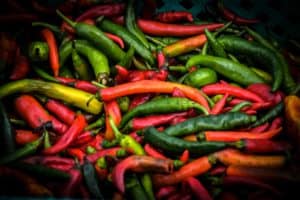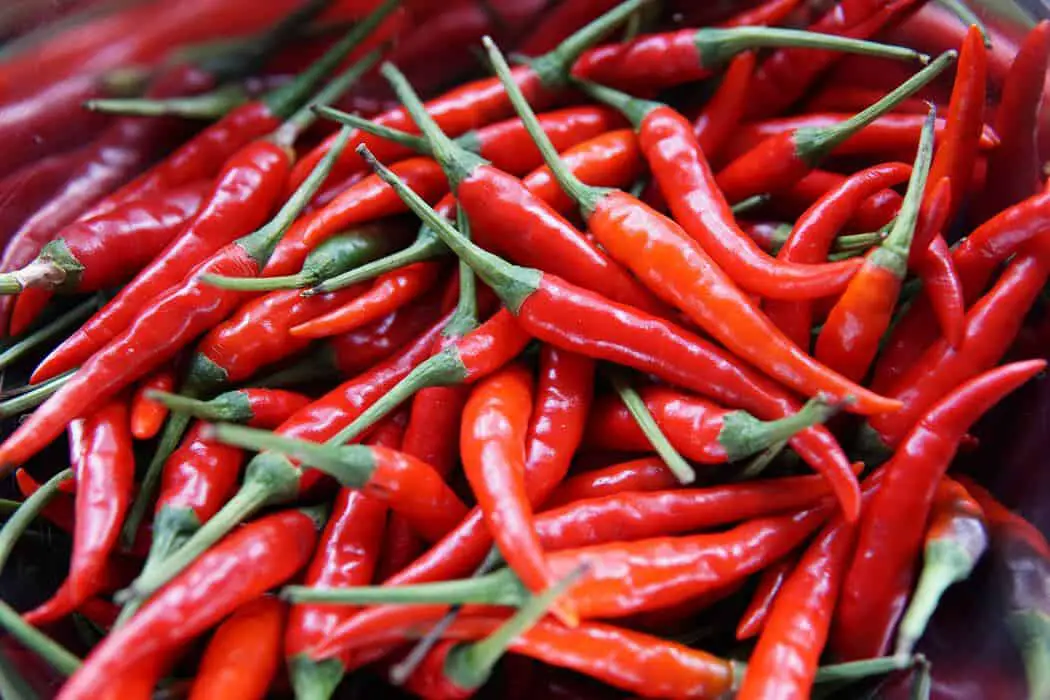Capsaicin is typically known for it’s property as the driving factor behind the ‘heat’ experienced from spicy foods. It’s the component of hot peppers that that makes them spicier than other foods.
While eating hot foods have an assortment of benefits, weight loss is actually one of the most overlooked. And you don’t just have to get your capsaicin via hot chili peppers either.
Capsaicin can be cosnumed through supplements, drops, hot sauces, and standard cayenne peppers and chili powder. In this article, I’ll go more in-depth as to how much capsaicin really helps with weight loss, the science behind this discovery, and how you could use it to help fuel your weight loss journey.
What Is Capsaicin?
Capsaicin is essentially the compound behind the scale of measuring spiciness (the scoville scale).
It is a natural active component of chili peppers, which is technically classified as an irritant for mammals (like humans). You’ll notice capsaicin when you eat food that’s too spicy, and suffer the resulting effects like sweating, hiccups, teary eyes, sore throat and mouth, and a runny nose.
While it may be an irritant, it’s an important ingredient when it comes to adding spice and flavor to a lot of great dishes
There are also a lot of added benefits of including capsaicin in your diet. Some of the biggest ones include:
-
Effective arthritis and pain treatment
When capsaicin is applied to the skin in the form of a topical cream, gel or patch, it activates specific nerve receptors that result in localized heat, stinging and/or itching sensations. Prolonged activation of these receptors causes them to lose their ability to function properly (and process pain signals) for extended periods of time.
Research has shown that capsaicin can be used regularly to in order to keep these nerve receptors from working properly and processing pain signals, which helps with chronic pain management for conditions like arthritis.
-
Can help with nasal congestion
According to Livestrong, one of the best ways to take cayenne pepper is in the form of a capsaicin nasal spray, which is easily available over the counter at most pharmacies.
-
May kill prostate cancer cells
Cayenne peppers might actually be able to offer special benefits for men, specifically through capsaicin. The capsaicin in these peppers has shown a positive effect on killing prostate cancer cells through apoptosis.
How Does Capsaicin Help You Lose Weight?
In short, capsaicin can be used to help with weight loss because it has been observed to increase the body’s metabolism. However there are a lot of other benefits of spicy foods that have connections to losing weight as well. Let’s break down how each of these works:
-
Increased metabolism
On average, studies have reported that meals that include a spicy component, such as chopped chili peppers, can increase a person’s metabolism by about 8 percent over the normal rate, at least for a short period of time. While this effect has only observed to be minor and short-lived, it can help with overall digestion, appetite reduction, and fat utilization much more efficiently than meals that don’t include a decent dose of capsaicin.
-
Reduction in visceral body fat
Along with lowering overall energy intake, some research also suggests that consuming capsaicin might be able to reduce the waist-to-hip measurement ratio, which is largely impacted by visceral body fat.
Visceral body fat is one of the most dangerous places for your body to store body fat, making this benefit exceptionally beneficial. Having excess body fat around the abdomen has been linked to heart problems, type two diabetes, obesity, and a variety of other metabolic issues.
-
Appetite suppression
Appetite suppression from capsaicin comes as a extra benefit from a sped up metabolism. When your body is processing food and energy at a faster rate, most people tend to feel full longer, and experience pangs of hunger much less frequently.
While it isn’t any sort of diet pill or hunger eliminator, it can help to reduce those cravings after a meal if incorporated as a spice for flavoring or side dish.
-
Helps you burn more calories
Along with speeding up your metabolism and reducing your appetite, the capsaicin within cayenne pepper is thought to help you burn calories at rest because of its spicy nature.
When you consume a spicy pepper, it causes your body’s overall temperature to temporarily rise. When your body’s temperature rises, even if for a short period of time, your body goes into a “cooldown mode”. This cooldown mode forces your body to burn calories in order to regulate your overall body temperature.
What Does the Research Say?
While there is still much research to be done in order to verify this connection, consumption of capsaicin has been strongly correlated to improved weight loss results. Check out the results from one particular study below:
“In one double-blind, randomized, placebo-controlled trial, it indicated that treatment of overweight or obese subjects with 6 mg/day capsinoid for 12 weeks was associated with abdominal fat loss measured by dual energy X-ray absorptiometry.”
One other study from 2012 measured an increase in energy expenditure (roughly 50 calories per day) when test subjects consumed capsaicinoid. The conclusion was that this could lead to significant amounts of weight loss if steadily consumed over the course of one or two years for those struggling with obesity.
There are some confounding variables still at play here, because people who are overweight and obese are also capable of shedding body fat much faster than others, but ongoing trials and studies hope to further illuminate this connection.
Best Capsaicin Supplements for Weight Loss
There are a few great capsaicin supplements on the market, and they all offer some unique benefits too. I’ve tried a ton from Amazon, and personally like the following the most:
- Nature’s Way Cayenne Capsules
- Super Cayenne
- NusaPure Cayenne Pepper
- Pure Evil Capsaicin Drops
- Pure Cap Hot Sauce
Side Effects of Capsaicin

-
Digestive problems
Ingesting too much capsaicin (often in the form of eating too many spicy foods) can cause a lot of mild to serious, and acute to chronic digestion problems in people. Frequently experienced digestive side effects to eating too much spicy food include: diarrhea, abdominal pain, nausea, cramps, burning sensations, development of stomach ulcers, and acid reflux.
If you suffer from IBS (irritable bowel syndrome), eating too much capsaicin can make those symptoms much worse too.
-
Asthma
Contrary to popular belief, it has been observed that if hot pepper is consumed in high enough quantities, it can actually trigger an asthma attack, typically in those who already have chronic cases of asthma, by causing air passages to spasm.
This reaction can be potentially dangerous if you don’t have an emergency inhaler or a nebulizer nearby. If you struggle with chronic asthma, it’s advised that you should stay away from hot pepper in large quantities. With most types of foods, tolerances can still be built up – so if you’re a spicy food fan and an asthmatic, you shouldn’t have to worry too much. As always, talk to your doctor when considering changing up your diet.
Another quick fix for capsaicin-induced asthma is antihistamines, traditionally used for allergic reactions.
-
Allergies
A lot of different types of spices are also known to be allergic triggers for people. With capsaicin, it can be challenging to know whether the spice is causing an allergic reaction, or if your body is just naturally responding to the side effects of the spice (running nose, watery eyes, burning mouth, sweating, itchiness, etc).
However there are some easier to spot symptoms after ingesting foods like chili powder, wasabi, and varieties of hot sauce. These include hives, trouble breathing, and frequent sneezing.
-
Potential hazard for eyes
You’ve probably heard it a million times, “don’t touch your eyes after eating spicy food”. While it sounds like a throwaway line at this point, there’s actually a lot of truth to it. If you use capsaicin in cooking and get any of it in your eyes, the result can be extremely painful, and may even require medical attention.
-
Mouth problems
Before capsaicin can get to your digestive system, it must first get past your mouth, and it can cause a multitude of problems within your mouth, around your gums and tongue, and around your throat.
Capsaicin is caustic to mucous membranes and can actually burn your taste buds if consumed in large enough (or concentrated enough) quantities. If you’re looking for a solution after eating food that’s too spicy, I wrote up a recent guide you can check out here.
-
Cancer risk
Evidence on the effects of capsaicin directly on cancer is fairly mixed. While there is know causation, there have been some interesting correlations observed, and further research is currently being done.
Observational studies in humans have recently linked chili pepper consumption to an increased risk of cancer, particularly around the gallbladder and stomach, which are two sensitive organs that can have a lot of other capsacin-induced side effects.
One other study identified red chili powder as a risk factor for mouth and throat cancer in India.
It’s important to note that these studies should not sway you in your use of capsaicin, as more research needs to be done. However a good rule of thumb is to just use capsaicin in moderation, and you should be safe in the long term. If you’re concerned about any of the above side effects of capsaicin, talk to your doctor to see if it’s right for adding to your diet.
Final Thoughts
Ultimately, eating hot peppers and spicy foods is actually one of the least efficient ways to get all of the benefits out of capsaicin. This is because it’s only in trace amounts in spicy foods, and all of the other elements of the foods with it tend to make it harder for the body to absorb it.
That’s why I prefer to supplement my capsaicin, using a few of the products that I mentioned above. However you don’t need capsaicin to lose weight, and sticking to a healthy, low carb diet is ultimately a much more stable, dependable approach.

